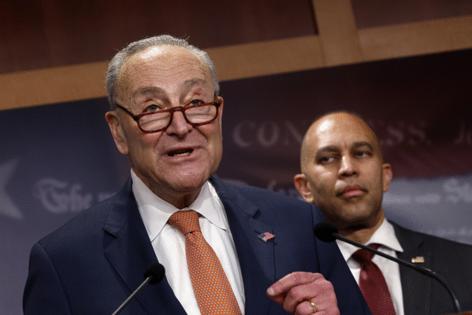Trump to meet with Democratic leaders ahead of shutdown deadline
Published in Political News
WASHINGTON — President Donald Trump is planning to meet with top congressional Democrats this week about the government funding impasse, White House and Capitol Hill officials said Monday, after lawmakers left Capitol Hill for a week on Friday with little movement toward averting a partial shutdown starting Oct. 1.
Trump will squeeze in the meeting on Thursday, a source familiar with the planning said, amid his packed schedule this week. He’s also slated to host Turkish President Recep Tayyip Erdogan at the White House on Thursday.
He’s departing for New York on Monday evening, where he’ll address the United Nations General Assembly on Tuesday and huddle with world leaders into the evening. On Friday, Trump will attend the opening round of the Ryder Cup golf match in New York state, White House Press Secretary Karoline Leavitt said earlier in the day at Monday’s briefing for reporters.
House Minority Leader Hakeem Jeffries, D-N.Y., and Senate Minority Leader Charles E. Schumer, D-N.Y., wrote to Trump on Saturday requesting a meeting after dueling versions of a stopgap spending bill were blocked in the Senate a day earlier.
Trump that evening said he’d meet with the Democratic leaders, but that it was unlikely to lead to a breakthrough.
“They want all this stuff. They don’t change. They haven’t learned from the biggest beating they’ve ever taken,” Trump said. “I’d love to meet with them, but I don’t think it’s going to have an impact.”
During Monday’s earlier briefing, Leavitt wouldn’t say whether a meeting was going to be scheduled, but didn’t rule it out.
“Discussions are ongoing with both Republican and Democratic members of Capitol Hill,” Leavitt said. “I don’t have any meetings or any scheduling updates for you today. But what I will share is … what this White House wants and what Republicans want, we want a clean funding extension to keep the government open.”
Health care divide
The House passed a continuing resolution running through Nov. 21 with limited “anomalies” to provide increased rates of funding for certain programs, as well as several routine extensions of expiring programs. But it leaves out the Democrats’ key asks, mainly an extension for health insurance tax credits that are set to shrink at year’s end under current law.
“Tens of millions of Americans are on the brink of their health care costs increasing by thousands of dollars per year, risking bankruptcy for many families,” Schumer and Jeffries wrote to Trump. “We do not understand why you prefer to shut down the government rather than protect the health care and quality of life of the American people.”
On a call with reporters earlier on Monday, Sen. Brian Schatz, D-Hawaii, a senior appropriator and likely the next party whip after the retirement of Sen. Richard J. Durbin, D-Ill., said a meeting was in the works.
“My understanding is the president agreed to the meeting and now it’s in the process of getting . . . landed on the calendar,” Schatz said.
He characterized the two parties as not that far apart on the health care tax credits issue, noting that Sen. Lisa Murkowski, R-Alaska, has introduced legislation to extend the bigger subsidies for two years.
Murkowski’s proposal “acknowledged what other Republicans are saying, both publicly and privately, which is . . . . that the loss of (Affordable Care Act) subsidies are a very urgent issue,” Schatz said. “And so they feel a sense of urgency on this, and I think conversations are ongoing.”
Democrats’ alternative continuing resolution, which Senate Republicans blocked on Friday, would have extended the expanded health care credits permanently and made a host of other expensive changes. All told, the provisions have been estimated to cost over $1.4 trillion, with roughly $1 trillion in new spending from repealing Medicaid and other cuts in this summer’s GOP budget reconciliation law.
Schatz appeared to recognize that a deal on the health care premium credits was the most likely place for a bipartisan agreement, given interest from various Republicans on both sides of the Capitol.
“You can kind of tell when something is a nonstarter, and this is not a nonstarter for many Republicans,” he said. “They understand this has to get fixed.”
Republican leaders have mostly been on message that negotiations on the health care tax credits can wait, since they don’t expire until Dec. 31.
Leavitt said the bill Democrats rejected last week is an extension of funding levels Schumer and Democrats provided votes for in March.
“That’s all we’re advocating for. A simple clean budget extension is (a) straightforward responsible solution to keep the government open to Nov. 21 and allow the full-year appropriations process to move forward,” Leavitt said.
But Democrats argue that with health insurers setting policy rates now, it will be too late to retroactively fix the problem for the 2026 plan year unless lawmakers act now. Schumer has said he’s open to letting the GOP stopgap bill go through without a health care fix, as long as Republican leaders commit to a pathway to getting the latter done in timely fashion.
Republican leaders have been waiting for a signal from Trump on how to proceed. Now, they might finally get that guidance they’ve been waiting for once the president meets with Democratic leaders.
_____
(David Lerman contributed to this report.)
_____
©2025 CQ-Roll Call, Inc., All Rights Reserved. Visit cqrollcall.com. Distributed by Tribune Content Agency, LLC.
























































Comments